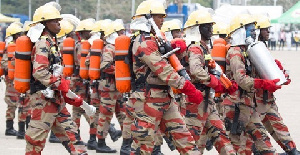The Ghana National Fire Service (GNFS) has conducted fire safety audits on 4,349 old and new facilities in all the regions of the country.
In addition to the fire audits, which began in January, last year, 9,997 educational campaigns were held in the regions as part of the service’s effort to reduce the prevalence of fire outbreaks in the country.
The facilities that were covered by the exercise included markets, gas and fuel stations, churches and mosques, farming and fishing communities, hotels, restaurants and hospitals.
The safety audits were to ensure that the facilities were updated with early fire warning and detective systems, small fire fighting equipment, source of water for fire fighting, hose reels, notices and places of assembly during emergencies.
For the educational campaigns, they were meant to help create awareness of fire outbreaks and how to prevent them.
Facilities
Speaking to the Daily Graphic, the Public Relations Officer (PRO) of the GNFS, Divisional Officer I, Mr Ellis Robinson Okoe, said the move had become necessary because of the number of fire outbreaks each year and the cost that came with them.
He stated that all the facilities captured in the fire safety audits had been given deadlines to meet the required standards or risk being shut down.
“Now we have done audit reports on many structures, including almost all the upcoming ones; our major problem is the old buildings, most of which were built to suit the purpose they were intended for during the time they built it but now they have been modified and are being used for different purposes which attract many visitors,” he said.
“Some do not even have evacuation plans, and we have recommended to them, where necessary, to break parts of the building to make way for adequate entry and exit routes for easy evacuation during emergencies,” Mr Okoe stated.
He said the GNFS had also observed that private residences were also prone to fires and, therefore, the service had made a proposal for the promulgation of a Legislative Instrument to make it compulsory for such buildings to also have fire safety mechanisms.
Limited staff and vehicles
The PRO said their target was to cover every part of the country but they were currently being faced with challenges with mobility and limited staff.
He said the service had limited logistics and sometimes traveling to some remote areas for educational campaign was a challenge.
“There is also a need for us to increase the number of our personnel, internationally, the ratio is one fireman to 800 civilians, but in Ghana, one fireman is to about 3,000 civilians.
“We need to close that gap, when that is done, there will be an improvement in the service.
In some stations, there is only one driver working each day of the week, meanwhile the labour law also applies to us,” he said.
Support
Mr Okoe further urged individuals and corporate institutions to support the service to ensure enhanced service delivery.
He underscored the need for estate developers to consider building fire stations in their facilities while the GNFS supplied them with firefighters and equipment, indicating that “if you build a fire station, it’s not for GNFS, it’s rather for the community and everyone gets to benefit.”
He said although the service was faced with many challenges, their preparedness to douse fires was very key and as a result, they had been able to bring down every fire they had fought regardless of the duration
Source: Graphic.com.gh
 Home Of Ghana News Ghana News, Entertainment And More
Home Of Ghana News Ghana News, Entertainment And More





